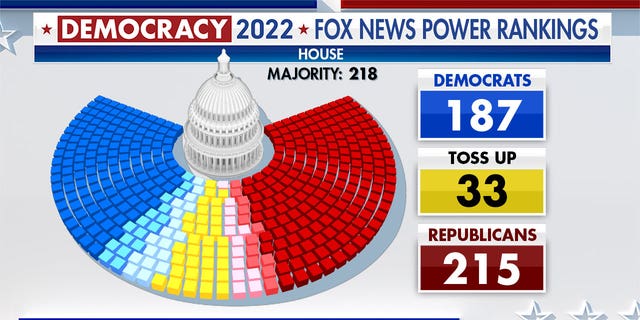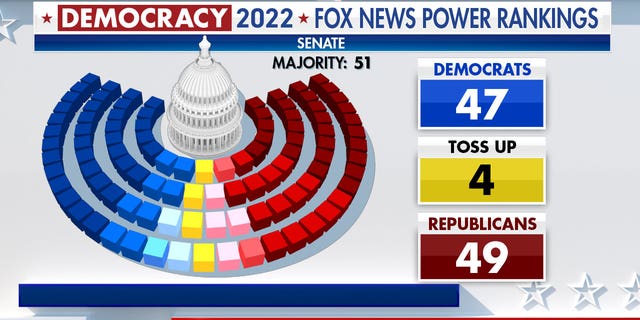A simple guide to midterm elections, how they affect the presidency, and more
What are the midterm elections?
Midterm elections occur every four years, halfway through a president’s term in office, occurring on the Tuesday after the first Monday in November. This year the midterm elections will be held on November 8, 2022.
Each midterm election cycle, Americans have the chance to vote on candidates for the House of Representatives, Senate, and state and local offices.
The House of Representatives, the lower chamber of Congress, is made up of 435 representatives serving two-year terms. Democrats currently hold a slim majority over Republicans in the House, 220-212. There are currently 3 vacant seats in the House.
The Senate, the upper chamber, consists of 100 Senators serving six-year terms. The Senate is currently split 50-50, however Vice President Kamala Harris, a Democrat, can cast a tie-breaking vote which gives Democrats a razor-thin majority in the Senate.
What is the purpose of midterm elections?
The outcome of the midterm elections will determine what party controls each chamber, influencing legislation that is considered and Congress’ willingness to work with the White House. The midterm elections are the often seen as referendum on a president’s four-year term in office, particularly for new presidents.
Each midterm election cycle, all 435 seats within the House of Representatives are up for election, compared to about one-third of Senate seats. At the state level, 36 states hold elections for governor and other local officials in midterm years.
FOX NEWS POWER RANKINGS: DEMS, GOP LOCKED IN CLOSE BATTLE AS FINAL MONTH OF CAMPAIGNING BEGINS
How do midterm elections affect the presidency?
While the presidency is not on the ballot during midterm election years, the midterms generally serve as a litmus test for the president’s popularity halfway through his term in office.
The outcome of the 2022 midterms will set the stage for the latter half of Biden’s first presidential term, as well as the 2024 presidential election. If the Democratic Party can hold onto a majority in one or both chambers, Biden should find it relatively easier to achieve his political agenda with the help of a Democrat-controlled Congress. If Republicans gain House and Senate majorities, Biden will find it increasingly more difficult to pull off significant legislative victories.

What party is favored to win in the 2022 elections?
This November, Republicans are favored to win a majority in the House, according to the latest FiveThirtyEight midterms forecast. There are roughly 30 seats considered ‘toss-ups’ that will determine control of the lower chamber this fall. Since midterm elections are often seen as a referendum on the current administration, the sitting president’s party generally loses seats in the House.
Historically, the president’s party loses on average 29 House seats the first midterm election, according to a Council on Foreign Relations report. In fact, only once since World War II has the president’s party ever picked up House seats in his first midterm election. That happened in 2002 under former President George W. Bush in aftermath of the September 11th attacks.
FOX NEWS POLL: POLARIZATION DEFINES THE MIDTERM ELECTIONS

On the other hand, control of the Senate is far less predictable. Republicans are defending 21 seats, while Democrats are defending only 14 seats.
In past midterm years, the president’s party has sometimes picked up seats in the Senate. This is due to a number of reasons but largely because only one-third of Senate seats are up for election in the midterms, according to the Council on Foreign Relations. Most recently, President Donald Trump gained two Republican Senate seats in 2018.
Which are the battleground states for the 2022 midterm cycle?
Republicans are favored to win a majority in the House. As such, most national attention on the midterms has focused on a few toss-up Senate races that will determine control of Congress. Those key races include Arizona, Georgia, Nevada, and Pennsylvania, according to the latest Fox News Power Rankings.

In the Arizona, Georgia, and Nevada Senate races, Democrat incumbents face a diverse group of Republican challengers. Pennsylvania is an open seat due to Sen. Pat Toomey, R-Penn., announcing his retirement in October 2020.
Read the full article Here


